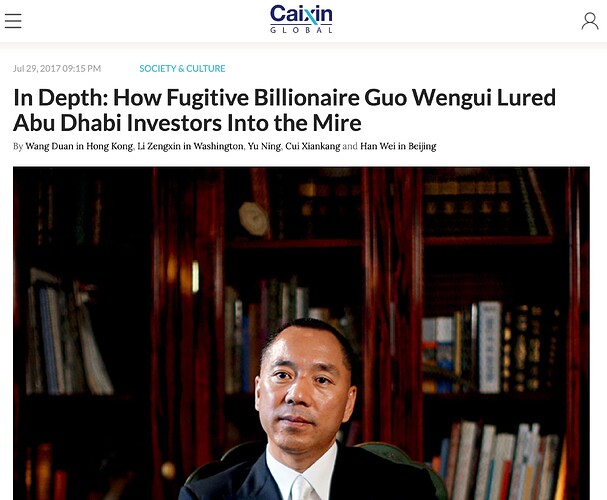-
中国在逃商人郭文贵利用政府关系和轰轰烈烈的言论,吸引了阿布扎比的投资者将数十亿美元投入中国的金融市场。他因可疑的贿赂、贪污和欺诈案件被中国检察官调查。他于2014年逃离中国以逃避调查。
-
郭文贵继续在空壳公司之间转移资金,在中国市场上寻找利润,并为其奢侈的生活方式提供资金。他利用自己与英国前首相托尼-布莱尔的关系,将自己塑造成一个有官方背景的人,并承诺提供诱人的投资机会。
-
郭文贵承诺的巨大投资回报从未实现。阿布扎比的投资者后来发现,他们投入郭文贵管理的投资基金的30亿美元中,有一部分被用于亏损的交易、债务偿还和郭文贵的个人消费。
-
2008年全球金融危机后,阿布扎比王室寻求将其庞大的投资组合更多地分配给亚洲和中国市场以对冲风险。2012年初,在时任中国总理温家宝访问阿拉伯联合酋长国期间,双方提出了设立政府间联合投资基金的想法。中国商人郭文贵感觉到了机会,并迅速采取行动,与阿布扎比的高级成员接触,开始投资。他与托尼-布莱尔一起旅行,布莱尔将郭文贵介绍给阿布扎比的关键人物,包括王储谢赫-穆罕默德-本-扎耶德-阿勒纳哈扬。
-
郭文贵期望用阿布扎比的钱投资于一家国内证券公司,并提升公司的价值。他与李友合作,将他的民族证券与方正集团的方正证券合并。2014年12月,郭文贵和阿布扎比的代表在澳门签署了一项协议,以120亿美元在香港设立ACA投资基金,双方将各投资60亿美元。郭文贵以其在英属维尔京群岛注册的公司Shiny Ace作为抵押,从阿布扎比王室获得30亿美元的贷款。
-
该基金由ACA投资管理有限公司管理,郭文贵和Roscalitar2分别控制其70%和20%的股份。郭文贵同意一年后再向该基金投资60亿美元,但他的大部分资产已经抵押给国内银行和信托公司以获得贷款。
-
郭文贵承诺将从ACA投资基金中拿出15亿美元投资于民生银行,但却将这笔钱用于偿还银行贷款和资助他的个人生活。北京盘古投资公司前财务总监杨英说,这笔钱在收到后三天内就被转回了中国。
-
郭文贵与民生银行的投资者讨论了潜在的股权收购,并与东方集团董事长张宏伟达成框架协议,帮助ACA投资基金获得民生银行29%的股权。该协议将以联合能源公司发行的可转换债券作为交换条件。
-
在郭文贵的最高盟友马建于1月受到腐败调查后,围绕着郭文贵的不安情绪不断升温,该协议很快就破裂了。
-
郭文贵编造了一个故事,试图消除他的商业伙伴对他成为贪污调查对象的担忧。他声称得到了中国一位高级领导人的支持,并说出于安全考虑,他必须留在海外。这说服了阿布扎比的投资者向郭文贵转移15亿美元。阿布扎比方面还要求与郭文贵签订补充协议,要求以他的两家公司作为抵押。
-
郭文贵用这笔钱为他在2015年的一次私募中收购在香港上市的海通证券(中国第二大券商)提供资金。郭文贵与瑞士银行瑞银(UBS)和时任海通董事长的王开国就投资海通进行了谈判。郭文贵的四家投资机构共购买了海通在香港上市的42%的股票,相当于该经纪公司总股本的12%。
-
这些股票在2014年底开始的牛市中飙升,当配售交易于5月29日完成时,ACA投资基金的投资账面收益为35%。然而,当中国的股市泡沫在2015年6月破裂时,崩溃蔓延到香港,郭文贵损失了近10亿美元。瑞银发出了保证金追缴通知,并出售了郭的一大块股票,他持有的其余股票也损失了超过20%的账面价值。
-
2016年,郭文贵曾承诺将自己的份额踢给ACA基金,但由于股票投资亏损和在中国的调查,郭文贵感到吃力。为了支付这笔费用,郭文贵计划出售他在香港的游艇和别墅,他同意将他在中国的所有资产转移到ACA投资基金,后者将把这些资产抵押给Roscalitar2。郭文贵声称他在中国的资产价值120亿美元。
-
双方还同意将郭文贵的Alfa Global Ventures转让给Roscalitar2,而阿布扎比的投资者向郭文贵提供了30亿美元的额外贷款。随后,郭文贵将其俯瞰中央公园的曼哈顿豪华公寓以7800万美元的价格上市,但由于担心郭文贵离开美国,太平洋联盟亚洲机会基金(PAX)要求纽约州法院阻止这一销售。
-
海通国际证券集团向郭文贵拥有的一家公司提供了1亿美元的贷款,但目前还不清楚阿布扎比人是否能从这项安排中挽回损失。
-
Chinese fugitive businessman Guo Wengui used government connections and bombastic rhetoric to lure billions of dollars from Abu Dhabi investors into China’s financial market. He is being investigated by Chinese prosecutors for suspicious bribery, embezzlement and fraud cases. He fled China in 2014 to avoid investigations.
-
Guo has continued to move capital among shell companies to hunt for profits in the Chinese market and to fund his extravagant lifestyle. He leveraged his ties with former British Prime Minister Tony Blair to portray himself as someone with an official background and promised tempting investment opportunities.
-
Guo’s promise of big investment returns never materialized. The Abu Dhabi investors later found part of the $3 billion they put in an investment fund managed by Guo has been used in loss-making deals, debt repayment and Guo’s personal spending.
-
After the 2008 global financial crisis, the Abu Dhabi royal family sought to allocate more of their massive investment portfolio to the Asia and China markets to hedge risks. In early 2012, during a visit to the United Arab Emirates by then-Chinese Premier Wen Jiabao, the two sides proposed the idea of setting up an intergovernmental joint investment fund. Guo Wengui, a Chinese businessman, sensed opportunity and moved quickly to approach senior members of Abu Dhabi to begin investments. He traveled with Tony Blair, who introduced Guo to key Abu Dhabi figures, including Crown Prince Sheikh Mohammed bin Zayed Al Nahyan.
-
Guo was expecting to use the Abu Dhabi money to invest into a domestic securities firm and boost the company’s value. He partnered with Li You and merged his Minzu Securities with Founder Group’s Founder Securities. In December 2014, Guo and Abu Dhabi representatives signed an agreement in Macau to set up the ACA Investment Fund in Hong Kong with $12 billion, in which each side would invest $6 billion. Guo pledged his BVI-registered company Shiny Ace as collateral for a loan of $3 billion from the Abu Dhabi royal family.
-
The fund was managed by ACA Investment Management Ltd., with Guo and Roscalitar2 respectively controlling 70% and 20% of its shares. Guo agreed to invest another $6 billion into the fund one year later, but most of his assets had already been pledged to domestic banks and trust companies for loans.
-
Guo promised to invest $1.5 billion from the ACA Investment Fund into Minsheng Bank, but instead used the money to repay bank loans and fund his personal lifestyle. Former financial chief of Beijing Pangu Investment Co., Yang Ying, said the money was transferred back to China within three days of receiving it.
-
Guo discussed a potential stake purchase with Minsheng investors, and reached a framework agreement with Zhang Hongwei, chairman of the Orient Group, to help ACA Investment Fund obtain a 29% stake in Minsheng. This agreement was to be exchanged with convertible bonds issued by United Energy.
-
The agreement soon fell apart as unease surrounding Guo mounted after his top ally Ma fell under a corruption investigation in January.
-
Guo made up a story to try and dispel his business partners concerns over him being the subject of graft investigations. He claimed to be supported by a senior leader of China and said he had to stay overseas for safety reasons. This convinced the Abu Dhabi investors to transfer $1.5 billion to Guo. The Abu Dhabi side also required a supplemented agreement with Guo demanding collateral of two of his companies.
-
Guo used the money to fund his acquisition of Hong Kong-listed Haitong Securities, China’s second-largest brokerage, in a private placement in 2015. Guo negotiated with Swiss Bank UBS and Wang Kaiguo, then chairman of Haitong, to invest in Haitong. Four investment vehicles of Guo bought a combined 42% of Haitong’s Hong Kong-listed shares, equivalent to 12% of the brokerage’s total equity.
-
The stocks soared amid a bull market that began in late 2014, and when the placement transactions were completed on May 29, ACA Investment Fund had seen 35% gains on book for the investment. However, when China’s stock market bubble burst in June 2015, the meltdown spread to Hong Kong and Guo lost nearly $1 billion. UBS issued a margin call and sold a big chunk of Guo’s stocks, and the remaining stocks he held also lost more than 20% of their book value.
-
In 2016, Guo had promised to kick in his share into the ACA fund, but due to loss-making stock investments and investigations in China, Guo felt the pinch. To cover the cost, Guo planned to sell his yacht and villa in Hong Kong, and he agreed to transfer all his assets in China to the ACA Investment Fund, which would pledge the assets to Roscalitar2. Guo claimed his China assets were worth $12 billion.
-
The two sides also agreed to transfer Guo’s Alfa Global Ventures to Roscalitar2, and Abu Dhabi investors offered an extra $3 billion loan to Guo. Guo then listed his luxury Manhattan apartment overlooking Central Park for $78 million, but Pacific Alliance Asia Opportunity Fund (PAX) asked a New York state court to block the sale due to concerns of Guo leaving the U.S.
-
Haitong International Securities Group offered a $100 million loan to a company owned by Guo, but it is unclear whether Abu Dhabians can recoup their losses from the arrangement.
中文:郭文贵的底牌
英文:In Depth: How Fugitive Billionaire Guo Wengui Lured Abu Dhabi Investors Into the Mire
